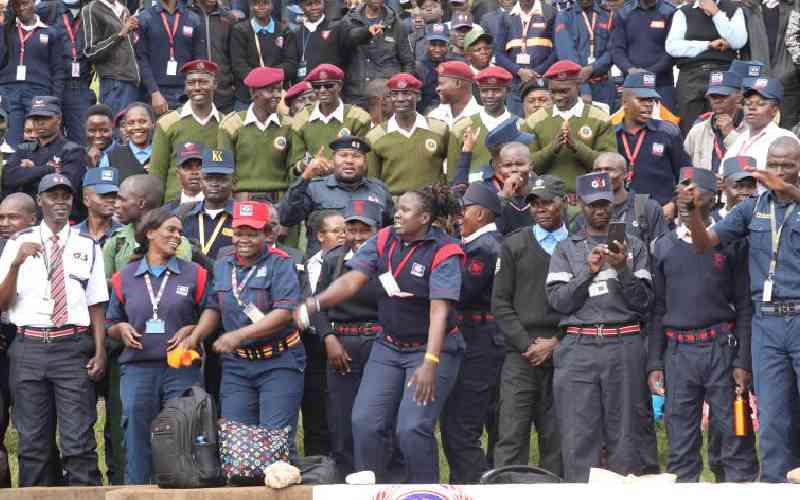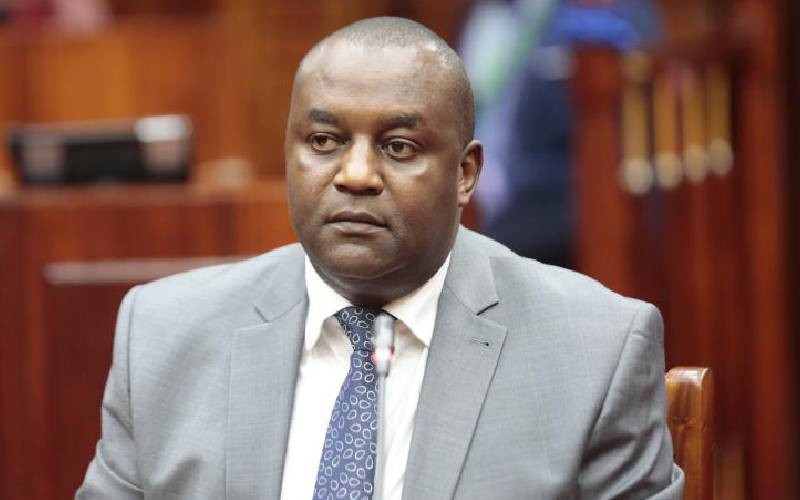Since the
attainment of Kenya’s independence in 1963, Raila Odinga stands as the greatest
threat to the entrenchment of liberal democracy in the country.
Kenya is one of
Africa’s few genuine growing democracies. According to the Ibrahim index of
African governance, over the last ten years Kenya has improved in Overall
Governance, the 9th largest improvement on the continent. As a result, the
country has been ranked position 12 on the continent.
However, the
extraordinary democratic and economic transformations the country has achieved
are significantly being endangered by Mr. Odinga’s policies and politics.
While it is true
that Mr. Odinga has greatly contributed to the development of liberalism in the
country, it can also be argued that his actions have been retrogressive. The
national rhetoric he has perpetuated over the years has often been more
divisive than conciliatory. A few examples include the 41 against 1 and the 40
against 2 in 2007 and 2013 respectively.
Transfer of power
During the launch
of Miguna Miguna’s book ‘Peeling Back the Mask’ a few years ago, Paul Muite
speaking at the launch asked:
“There is some
unfinished business about the attempted coup d’état in 1982. I think Kenyans
would wish to hear the views of the Prime Minister so that people can be able
to properly put into context the democratic credentials, respect for the law
and constitutionalism… The Prime Minister should tell Kenyans… was he aware
before the elections about this formula of 41 against one? Was he a
beneficiary? It is ethnic mobilization. He should tell Kenyans what he knew
about it.”
Raila does not
respect the principle of ‘peaceful transfer of power’. Several instances of
these include the 2013 and 2017 demonstrations where many died, and the failed
1982 coup d’état.
Despite denying
his involvement in the latter, he eventually conceded to his central role in
the incident in his biography Enigma by Babafemi Badejo. This was done in the
full knowledge that no legal action could be taken against him due to the legal
statute of limitation.
Okoa Kenya
Elections are the
lifeblood of a liberal democracy that guarantees peace. Rather than taking
power through violent means, actors use democratic electoral processes to
ascend to power. Pointedly, this ensures the continued cementing of liberal
ideals like constitutionalism, human rights, pluralism, and the rule of
law.
However, since Mr.
Odinga started vying for the Presidency, he has never conceded defeat in
electoral contests. Rather, he has been quick to resort to violence as the
first means for resolving disputes.
Additionally, the
continual assault on the Independent Electoral and Boundaries Commission (IEBC)
by Mr. Odinga and his Opposition brigade, greatly points to a pattern of trying
to establish electoral authoritarianism.
The OKOA
Referendum and Firimbi Movement saw the conducting of regular demonstrations
across the country in 2016 to force the IEBC commissioners out of office. This
was based on the perceptions that the IEBC was culpable in his defeat in 2013
and recently this year. Therefore, it is incapable of conducting free and fair
elections.
According to
Andreas Scheduler, electoral authoritarianism is the attempt by political
elites to institutional facades of democracy, including regular multiparty
elections, in order to conceal (and reproduce) harsh realities of authoritarian
governance.
Stay informed. Subscribe to our newsletter
Countrywide demos
As a result,
leaders devise discriminatory electoral rules, exclude rival forces from
entering the electoral arena and circumscribe the flow of public information
via the mass media.
By doing this, it
violates liberal democratic values of freedom, fairness and integrity in so
systematic and profound ways as to render elections instruments of
authoritarian rule rather than instruments of democracy.
Raila has been
trying to achieve this through several ways. Firstly, through the IPPG model.
The disbandment of IEBC has largely been influenced by the role played by the
Inter-Party Parliamentary Group (IPPG) in 1997.
IPPG brought
together members of the opposition and those of the ruling party KANU. The
group was formed after countrywide protests by the opposition as they agitated
for reforms during the Moi regime.
The IPPG pushed
for electoral reforms, by having political parties nominate commissioners to
the former ECK. The opposition was always keen on adopting the IPPG model in
reconstituting the IEBC.
Radical changes
Thereafter, the
Coalition for Reforms and Democracy (CORD) launched the OKOA Kenya referendum.
This was grounded on delegitimizing the IEBC’s capability to carry out credible
elections this year.
Through the
initiative, CORD called for the amendment of Article 88 of the Constitution,
which gives procedures on the composition of IEBC commissioners. The draft Bill
proposed that the commission should, “consist of five commissioners nominated
by political parties based on their numerical strength in parliament in the
previous General Elections and gazetted by the President.”
In the aftermath
of OKOA Kenya, Mr. Odinga blamed the election body for bungling the
initiative’s attempt to amend the 2010 Constitution by not collating the
public’s signatures properly.
Raila Odinga has
largely believed that by reconstituting the electoral body with favorable
commissioners, it would rid IEBC of the institutional biases that have
prevented him from winning elections.
For that reason,
ODM has consistently argued that it will be impossible to have free and fair
elections in 2017 without radical changes to the electoral body.
Grave threat
Contrastingly,
when it came to party primaries in 2017, ODM was frequently accused of
manipulating the electoral processes to favor certain individuals. According to
the Star Newspaper on May 26, fraud and forgery saw the party send a new list
of nominees to the IEBC.
The changes were
made after the nomination processes and affected Muhoroni, Nyatike, Nyakach and
Kisumu East constituencies. Raila’s party was on the spot on how senior
officers at the ODM headquarters are using their juniors to install their
preferred candidates.
In this regard, Mr.
Odinga’s policies so far have posed a grave threat to the right of Kenyan
citizens to cast their preferred votes in a manner that is peaceful and
respects the rule of law. Electoral authoritarianism as a strategy of manipulating
electoral processes is greatly defining Mr. Odinga’s legacy.
 The Standard Group Plc is a
multi-media organization with investments in media platforms spanning newspaper
print operations, television, radio broadcasting, digital and online services. The
Standard Group is recognized as a leading multi-media house in Kenya with a key
influence in matters of national and international interest.
The Standard Group Plc is a
multi-media organization with investments in media platforms spanning newspaper
print operations, television, radio broadcasting, digital and online services. The
Standard Group is recognized as a leading multi-media house in Kenya with a key
influence in matters of national and international interest.
 The Standard Group Plc is a
multi-media organization with investments in media platforms spanning newspaper
print operations, television, radio broadcasting, digital and online services. The
Standard Group is recognized as a leading multi-media house in Kenya with a key
influence in matters of national and international interest.
The Standard Group Plc is a
multi-media organization with investments in media platforms spanning newspaper
print operations, television, radio broadcasting, digital and online services. The
Standard Group is recognized as a leading multi-media house in Kenya with a key
influence in matters of national and international interest.






